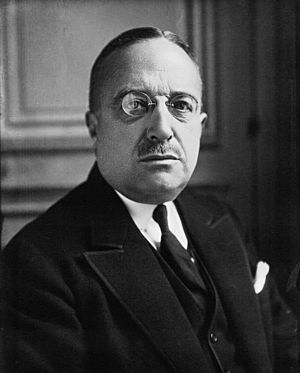André Tardieu facts for kids
Quick facts for kids
André Tardieu
|
|
|---|---|

Tardieu in 1928
|
|
| Prime Minister of France | |
| In office 20 February 1932 – 3 June 1932 |
|
| President | |
| Preceded by | Pierre Laval |
| Succeeded by | Édouard Herriot |
| In office 2 March 1930 – 13 December 1930 |
|
| President | Gaston Doumergue |
| Preceded by | Camille Chautemps |
| Succeeded by | Théodore Steeg |
| In office 2 November 1929 – 21 February 1930 |
|
| President | Gaston Doumergue |
| Preceded by | Aristide Briand |
| Succeeded by | Camille Chautemps |
| Personal details | |
| Born |
André Pierre Gabriel Amédée Tardieu
22 September 1876 Paris, France |
| Died | 15 September 1945 (aged 68) Menton, France |
| Political party |
|
André Pierre Gabriel Amédée Tardieu (22 September 1876 – 15 September 1945) was a very important French politician. He served as Prime Minister of France three times between 1929 and 1932. He was a smart conservative leader during a challenging time, especially when the worldwide economic crisis known as the Great Depression began.
Biography
André Tardieu came from a talented family; his grandmother, Charlotte Tardieu, was a composer and pianist. André went to top schools in France, including the Lycée Condorcet. He was even accepted into the very famous École Normale Supérieure, but he chose to work in the diplomatic service instead.
Later, he left the diplomatic service and became well-known as a foreign affairs editor for a newspaper called Le Temps. He also started his own conservative newspaper, L'Echo National.
In 1914, Tardieu was elected to the Chamber of Deputies, which is like a parliament, representing the area of Seine-et-Oise. He was a member of the center-right Democratic Republican Alliance party. He held this seat until 1924 and later represented another area, Territoire de Belfort, from 1926 to 1936.
When World War I started, Tardieu joined the army. He served until 1916, when he was wounded and had to return home. After that, he went back to politics. He worked closely with Georges Clemenceau during the Paris Peace Conference in 1919, helping with cooperation between France and America. In November 1919, he became the Minister of Liberated Regions, which meant he was in charge of areas like Alsace and Lorraine that had been freed.
Tardieu returned to government in 1926 as the Minister of Transportation. In 1928, he became the Minister of the Interior, which is like a minister for home affairs.
In November 1929, Tardieu became the Prime Minister of France. Even though he was seen as a conservative, he introduced many new programs to help people. These included public works projects, social insurance, and making secondary schooling free for everyone. He also encouraged modern ways of doing things in industry. In 1932, a law was passed that gave money to families with at least two children who worked in businesses and industries.
Tardieu wanted to change how politics worked in France. He believed that if businesses were more active and successful, it would help reduce poverty and improve life for working people. His main goal as a leader was to bring prosperity to France. When the Great Depression began in 1929, he worked hard to prevent France from falling into a deep economic crisis, and this worked for a few years.
Tardieu was briefly out of office for ten days in early 1930 but returned as Prime Minister until December of that year. He then served as Minister of Agriculture in 1931 and Minister of War in 1932. He became Prime Minister again from February to June 1932, also serving as Minister of Foreign Affairs, until his government lost the elections.
During his time as Prime Minister, Tardieu also served for a few days (May 7-10, 1932) as the acting President of the French Republic. This happened after the assassination of President Paul Doumer and before the election of the new president, Albert Lebrun.
In 1934, he briefly served as a Minister of State without a specific department. Later in his political life, he focused on dealing with Germany's growing power.
In his two-volume book, La Révolution à refaire (which means "The Revolution to Redo"), Tardieu shared his criticisms of the French parliamentary system.
See also
 In Spanish: André Tardieu para niños
In Spanish: André Tardieu para niños
- Interwar France
 | John T. Biggers |
 | Thomas Blackshear |
 | Mark Bradford |
 | Beverly Buchanan |

